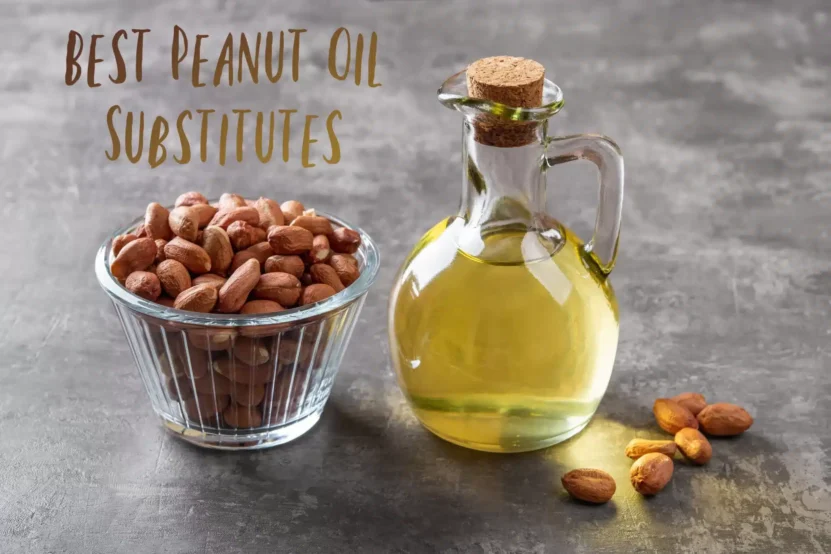Are you a fan of cooking with peanut oil but suddenly find yourself without it? Don’t worry, we’ve got you covered! There are a variety of oils that make great substitutes for peanut oil in your favorite recipes. Whether you’re looking for something with a similar nutty flavor or just need an oil that can withstand high heat, we’ve gathered the 10 best oils to use as peanut oil substitutes. Keep reading to learn more about these versatile and delicious options!
About Peanut Oil

Peanut oil is a type of vegetable oil that is extracted from peanuts. It has a light, nutty flavor and is commonly used in cooking due to its high smoke point and neutral taste. This makes it ideal for deep-frying, sauteing, and stir-frying.
The process of extracting peanut oil involves shelling the peanuts before they are roasted or pressed into oil. The resulting oil can be refined or unrefined depending on the desired end product. Refined peanut oil has been filtered and processed to remove any impurities while unrefined peanut oil retains more of its natural flavor.
One unique aspect of it is that it contains high levels of monounsaturated fats which have been linked to lower cholesterol levels and reduced risk of heart disease. Additionally, it contains vitamin E which acts as an antioxidant in the body.
While peanut allergies are relatively common, highly-refined peanut oils have been shown to contain very small amounts (if any) of allergenic proteins making them safe for those with allergies to consume.
Peanut Oil is a versatile cooking ingredient that offers unique flavors while also offering health benefits when consumed in moderation.
The Different Types of Peanut Oil
Peanut oil is made from the pressing of peanuts. It is a popular cooking oil around the world because it has a mild flavor, high smoke point, and low cholesterol content. However, there are different types of peanut oils available in the market that may confuse you when choosing which one to use.
The first type is refined peanut oil which undergoes a refining process to remove impurities and enhance its shelf life. This results in a clear, pale-yellow color with no taste or smell.
The second type is unrefined or cold-pressed peanut oil which retains more of its natural nutrients and flavors but has a shorter shelf life due to not being chemically processed.
Another variation of peanut oil is high-oleic acid peanut oil which has an increased level of monounsaturated fats that makes it more stable at higher temperatures.
Roasted peanut oil adds another layer of flavor with its nutty aroma making it great for salad dressings or drizzling over finished dishes.
Knowing these different types can help you choose the right kind depending on what dish you’re preparing or your personal preference.
10 Best Oils You Can Use As Peanut Oil Substitutes

Here are the 10 best oils you can use as a replacement for peanut oil.
1. Sunflower Oil- This is a great option if you are looking for an oil with high smoke point and neutral flavor. It’s also rich in vitamin E, making it good for your skin.
2. Soybean Oil- Soybean oil has a mild flavor that won’t overpower other ingredients in your dish. It’s also one of the most affordable options out there.
3. Canola Oil- Canola oil has similar properties to vegetable oil but contains less saturated fat, making it healthier overall.
4. Safflower Oil- A light and neutral-flavored option, safflower oil works well in baked goods because of its high smoke point.
5. Grapeseed Oil- Grapeseed oil is another neutral-flavored alternative that can be used in place of peanut oil, especially when frying or baking at high temperatures.
6. Corn Oil- Corn is one of the most common types of cooking oils available in supermarkets around the world due to its versatility and affordability
7. Avacado Oil- This flavorful alternative not only substitutes peanut-oil perfectly but also provides monounsaturated fats which help reduce bad cholesterol levels while increasing good cholesterol levels
8. Walnut Oil- While being on the expensive side this nutty flavored oil does wonders on salads and bread dips!
9. Hazelnut Oil- Rich hazelnut flavor makes this perfect as toppings over cakes or added to shakes!
10. Coconut Oil- A versatile all purpose ingredient coconut-oil provide healthy medium-chain fatty acids (MCFAs) which support weight loss & brain function
Choose any of these suitable alternatives according to their taste profile or health benefits they offer depending upon what suits your needs best!
How to Choose the Right Peanut Oil Substitute

When looking for a substitute, there are several factors to consider. First, you’ll want to think about the dish you’re making and what kind of flavor profile you’re going for. Some oils have strong flavors that may not work well in certain recipes.
Another important factor is smoke point. If you’re using high heat for cooking, you’ll want an oil with a higher smoke point so it doesn’t burn or become rancid.
Consider the health benefits as well. Some oils are healthier than others and can provide additional nutrients to your dish.
You’ll also want to take into account availability and cost. Some substitutes may be harder to find or more expensive than others.
Some great substitutes include sunflower oil, grapeseed oil, vegetable oil, avocado oil, sesame oil, coconut oil, canola oil, olive oil and soybean Oil – each with their own unique flavor profiles and benefits depending on the recipe at hand.
Choosing the right peanut substitute comes down to considering all these various factors and finding an option that works best for your particular needs.
Conclusion
Peanut oil is a versatile and flavorful ingredient that adds a rich taste to many dishes. However, if you have an allergy or simply want to try something new, there are many other oils available that can be used as substitutes in your cooking.
When choosing substitute, consider the smoke point and flavor profile of the oil. Some great options include grapeseed oil for high-heat cooking, avocado oil for its mild flavor and health benefits, and coconut oil for its unique taste and versatility.
By experimenting with different oils in your recipes, you can discover new flavors while keeping your meals healthy and delicious. So go ahead and try out some of these peanut oil substitutes – you may just find a new favorite!
